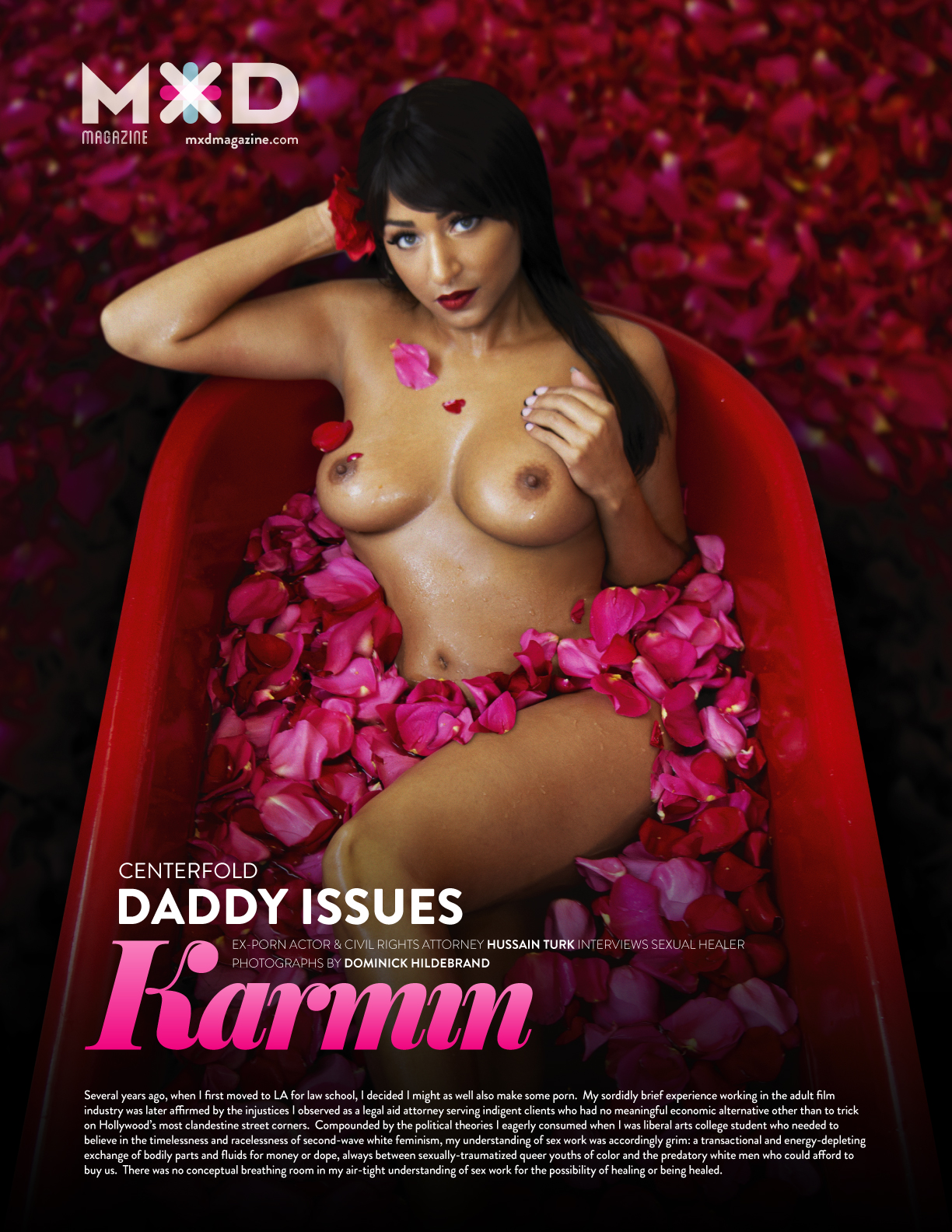
Daddy Issues: Ex-porn Actor & Civil Rights Attorney Hussain Turk Interviews Sexual Healer Karmin
Cover shot on location in Casa 360° courtesy of Scott Rice. Photos by Dominick Hildebrand.
Several years ago, when I first moved to LA for law school, I decided I might as well also make some porn. My sordidly brief experience working in the adult film industry was later affirmed by the injustices I observed as a legal aid attorney serving indigent clients who had no meaningful economic alternative other than to trick on Hollywood’s most clandestine street corners. Compounded by the political theories I eagerly consumed when I was liberal arts college student who needed to believe in the timelessness and racelessness of second-wave white feminism, my understanding of sex work was accordingly grim: a transactional and energy-depleting exchange of bodily parts and fluids for money or dope, always between sexually-traumatized queer youths of color and the predatory white men who could afford to buy us. There was no conceptual breathing room in my air-tight understanding of sex work for the possibility of healing or being healed.
In the aftermath of my wannabe-pornstar-phase, I thought I had fallen in love with a man who was very decidedly disgusted by my past. I tried convincing him that my decision reflected some deep socially just commitment to increase the representation of Pakistani men in gay porn, or simply that I did what I had to do to make my way through law school. But there really isn’t an underrepresentation problem for skinny brown bottoms, and I attended law school on a scholarship supplemented by a generous allowance from my parents. I did it because I have daddy issues.
So does Karmin.
Born in LA to a white father and a Black and Cherokee Indian mother, Karmin was adopted by a white Canadian couple from Ontario when she was only a few days old. Her adoptive parents, whom she simply and completely regarded as her mother and father, adopted four other children whose roots stretched from South America to Africa to Europe. When she was about four years old, Karmin’s father left.
The wound of being abandoned by two fathers at such a young age expressed itself through Karmin’s youthful hypersexuality, which attracted older men who resembled the father figure she was denied. The underside of being abandoned by two fathers was reflected in Karmin’s inability to express self-esteem and enforce healthy boundaries, which ultimately prevented Karmin from keeping herself safe. What followed was a series of destructive and toxic relationships with men for whom Karmin developed unrealistic expectations and unconditional positive regard, leading her to neglect caring for or valuing herself.
My father never left us. He spent my entire life working hard to provide us with a privileged life of security and comfort. He worked so hard that I hardly ever saw him. I grew to hate him because I couldn’t understand why I desperately craved his attention and approval. I too developed a youthful hypersexuality that attracted older men who validated me when my father wouldn’t. And like Karmin, I was too young and too wounded to protect myself from the predators who were lying in wait. At the age of twelve, I was catfished and groomed by a forty-something-year-old who proceeded for three years to exploit me into producing child pornography with nothing more than a dial-up modem and a webcam.
Obviously, not every adult film performer is a survivor of child pornography, but I was, and through it I learned to satisfy my needs by inappropriately exposing my body to be consumed by others. Absent a sustained and sustainable commitment to healing the wounds left behind by my daddy issues, I was vulnerable to the re-traumatization of those wounds, with which I could not not form passionate attachments that became constitutive of my identity and relationships. I proceeded for the following years to seek sexual validation from older white men through arrangements and relationships that hinged on easily exploitable power dynamics replete with emotional and physical abuse. Karmin similarly lost touch with the reality of her needs and like clock-work we both grew up much faster than we could, or should, have.
Our daddy issues will probably always be a part us. But instead of a breeding ground for exploitation and self-destruction, our daddy issues can become part of a safer and more functional adult sexual expression. To heal and be healed depends, at first, upon the awareness of our woundedness. That awareness becomes part of a dialectic of healing, informing the substance of how we respond to what we needed when we were first wounded. Healing our inner child enables us to be the parent we sought all along, but could never find in others.
Karmin connects with her inner child by watching Disney movies in her free time. When upset, she’ll often draw a picture with her left hand and have her inner child describe what the picture expresses. Then, Karmin will draw a responsive picture with her right hand and describe how she will address the needs expressed by her inner child. Another important aspect of Karmin’s healing is allowing others to nurture her by cooking, cleaning and reading her bedtime stories.
Healing, as such, is hard work, but to not do it is even harder. Unhealed, we make decisions that leave us exposed: I decided to work in porn on the eve of another failed relationship because I was desperate for validation and attention. I reverted into my twelve-year-old self, whose only way of finding comfort was through the exploitative gaze of others. I know now that that is why and for so long I was mired in shame about my past.
Karmin also decided to sell sex, but her decision to do so was firmly rooted in something other than her childhood wounds. She considers sex work as an empowering choice that reflects a liberated composite of her passions for service, beauty, and empathy. Through her work, which she describes as sexual healing, Karmin holds space for her clients to connect with and relate to their feelings, needs, and desires. She has had clients come to her after being diagnosed with a terminal illness because they want to spend their final months being connected with and nurtured. Karmin also sees men who struggle with eating disorders and other psychopathologies that inhibit their ability to engage with someone who could potentially be a life partner. Through their healing, Karmin is healing.
One of the most fulfilling feelings Karmin experiences in her work arises when a client walks in the door and she greets him with a deep and long closed hug. As she feels his body relax through his shoulders, they breath together like he’s never breathed before as his anxiety melts away, along with any residual tension around deadlines or showing up for someone else or whatever else happens to be going on in life.
The purity and authenticity in Karmin’s voice as she described that first embrace made my harsh preconceptions disappear and my eyes fill with tears as my inner child emerged, longing for the safety of an embrace that says to me, “This is for you, this is your time to be nurtured.”
I wrapped my arms around myself and softly promised to keep him safe.







